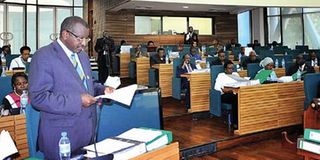Law to harmonise states’ legislations with EAC sought

A past East African Legislative Assembly session in progress in Arusha. PHOTO | FILE
What you need to know:
The East African Legislative Assembly (Eala) believes the enactment of an omnibus law would cure, if not overcome, challenges of harmonisation of the member countries’ legislations on the community and implementation of joint programmes.
Arusha. A new legislation intended to harmonise all national laws pertaining to the East African Community (EAC) by all partner states has been proposed.
The East African Legislative Assembly (Eala) believes the enactment of an omnibus law would cure, if not overcome, challenges of harmonisation of the member countries’ legislations on the community and implementation of joint programmes.
The regional Assembly, which ended its plenary session in Dar es Salaam recently, also wants an administration law for the Common Market Protocol be instituted to ensure its smooth implementation.
“The assembly is of the view that such a move shall cure existing challenges of harmonisation of partner states’ laws pertaining to the community,” said Bobi Odiko, the spokesman of Eala in a statement to the media.
In the same vein, the Eala session, the first to be held in the country’s commercial capital in nearly three years, tasked the EAC Council of Ministers to prioritise harmonisation of laws for EAC “in order to facilitate integration within the set time frames”.
The Council, which is the policy organ of the community, directed the Sectoral Council on Legal and Judicial Affairs to expedite implementation of the entire Article 126 of the EAC Treaty which obliges partner states to harmonise legal training and certification and encourage standardisation of judgments of courts within the bloc. Before the House was adjourned on March 17, this year, it approved the Report of the Committee on Legal Rules and Privileges on the oversight activity on the harmonisation of national laws in the EAC context.
The Report presented to the House by Dora Byamukama (Uganda) on behalf of the chair of the committee, Mr Peter Mathuki (Kenya), follows an oversight activity carried out by the team on February 22- 26, 2016.
Chapter 24 of the Treaty provides for co-operation in Legal and Judicial Affairs. Specifically, Article 126 (2) (b) of the Treaty provides that “Partner States shall, through their appropriate national institutions, take all necessary steps to harmonise all their national laws pertaining to the community”.
In line with the Treaty’s provision, EAC partner states established a sub-committee on the approximation of national laws in the EAC context.
During the oversight activity, the committee was informed that partner states were at different stages of implementation of the directives of the Council of Ministers on harmonisation on national laws.
It further observed that partner states were slow when it comes to amending laws to comply with the directive of the Council of Ministers pertaining to harmonisation of national laws. Further on, the criteria used and timelines for harmonisation of laws was also unclear.
The committee cites a number of challenges, including frequent changes in the membership of the Task Force, conflicting commitments of members of the Task Force as well as different legal systems.
In addition, the slow pace in the implementation of the harmonisation agenda at national level and the lack of monitoring mechanisms to ensure partner states comply with the adopted approximation proposals were also cited.
During the debate, Ms Judith Pareno (Kenya) said the activity of harmonising and approximating laws was a Treaty matter and that it was important for the community to have a system of the laws to harmonise.
A lawmaker from Tanzania, Ms Shyrose Bhanji remarked that slow implementation of harmonising laws was retrogressive for integration.
She asked the House to request the Council of Ministers to share with the assembly a matrix showing progress of implementation.
“We also need a special strategy to popularise the laws passed by the assembly to the citizens”, said Ms Bhanji, according to an Eala dispatch to The Citizen in Arusha.
An Eala member from Rwanda, Martin Ngoga called for a rethink of strategy in the way the community undertakes its mandate as it advances the objectives of integration. Harmonisation of laws is just one of the ways but there are a number of things we need to do with reference to Article 126.
“Why are we not publishing East Africa law journals? There are over 600 laws that we need to harmonise to make EAC realise the Common Market and we must move faster,” he pointed out. The legislator said Eala must take the lead.
“It is the assembly’s role to make laws and we should not take back the matter to partner states” he said. “We must reassess our mode of work”, he added.
Susan Nakawuki (Uganda) remarked that it was key for the harmonisation of immigration laws to be speedily undertaken. “One of the key issues we need to address is that of the yellow fever certificates and I request the Council of Ministers to inform us of the position of the community on the matter,” she said.




